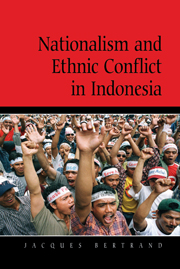Book contents
- Frontmatter
- Contents
- List of figures and tables
- Preface
- Maps
- 1 Introduction
- 2 Critical junctures, nationalism, and ethnic violence
- 3 The national model and its institutional history
- 4 Exclusion, marginality, and the nation
- 5 Islam and nation: The Muslim–Christian dimension
- 6 The escalation of religious conflict
- 7 Conflict in Maluku
- 8 Late integration into the nation: East Timor and Irian Jaya (Papua)
- 9 Aceh's ethnonationalist conflict
- 10 Autonomy as a solution to ethnic conflict
- 11 Unity in diversity
- Notes
- Glossary
- Bibliography
- Index
- CAMBRIDGE ASIA–PACIFIC STUDIES
6 - The escalation of religious conflict
Published online by Cambridge University Press: 10 December 2009
- Frontmatter
- Contents
- List of figures and tables
- Preface
- Maps
- 1 Introduction
- 2 Critical junctures, nationalism, and ethnic violence
- 3 The national model and its institutional history
- 4 Exclusion, marginality, and the nation
- 5 Islam and nation: The Muslim–Christian dimension
- 6 The escalation of religious conflict
- 7 Conflict in Maluku
- 8 Late integration into the nation: East Timor and Irian Jaya (Papua)
- 9 Aceh's ethnonationalist conflict
- 10 Autonomy as a solution to ethnic conflict
- 11 Unity in diversity
- Notes
- Glossary
- Bibliography
- Index
- CAMBRIDGE ASIA–PACIFIC STUDIES
Summary
The Islamization of the late New Order increased tensions between Christians and Muslims. The trend toward a greater role for Muslims in government, the creation of ICMI, and the simultaneous marginalization of Christians signaled that past practises were gone and a new basis of power was being created. How far would these changes go? For most Muslim groups, Suharto's change of heart was an opportunity to reverse past exclusion. Some still sought to advance an Islamic political agenda. Christians deplored their sudden displacement from core institutions that spelled an end to their protected status. Would their interests be preserved in the future? Would they be subjected to discriminatory practises and repression? The political relevance of religion and its importance for representation in the New Order's institutions solidified group identities and reinforced each group's perception that gains for one meant losses for the other.
Growing uncertainty about the future of the New Order regime added to these factors. Suharto had been re-elected by the People's Consultative Assembly (MPR) for another term but it was widely believed it would be his last. Succession was a central concern because no one knew whether it would lead only to Suharto's replacement or to the dismantlement of New Order institutions. Christians worried that the post-Suharto era might lead to an Islamic state or to majority rule that would exclude them. Muslim groups, especially ICMI, began to distance themselves from Suharto.
- Type
- Chapter
- Information
- Nationalism and Ethnic Conflict in Indonesia , pp. 90 - 113Publisher: Cambridge University PressPrint publication year: 2003

